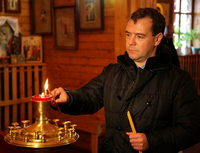With the Russian government having assumed an increasingly aggressive posture regarding the country's territorial dispute with Japan in recent months, the question naturally arises, Why? Senior Russian leaders, including President Dmitry Medvedev and Defense Minister Anatoly Serdyukov, have broken with precedent and visited what the Russians call the Southern Kurils and what the Japanese label their Northern Territories. The Russian government has also announced plans to enhance the islands' socio-economic development and defenses. The escalating crisis led the counselor for European Affairs at the Japanese Foreign Ministry to characterize the Russian-Japanese relationship last week as being at its lowest point in decades.
A number of factors help explain Moscow's new course. To begin with, domestic political conditions in Russia and Japan create an environment favorable for confrontation. Since the mid-1990s, public opinion surveys have shown that Russian respondents have overwhelmingly opposed making any further major territorial concessions, whether it be to Japan or any other country. Russian leaders must therefore highlight their nationalist credentials as well as their unwillingness to make concessions regarding Russia's core national interests.
Upcoming elections -- in 2011 for parliament and in 2012 for the presidency -- make it especially difficult for Russian politicians to make major concessions to Japan. Medvedev's political team is concerned that he lacks the hard-line credentials that make Prime Minister Vladimir Putin and his coterie so popular. But with the president unwilling to sacrifice improving ties with the United States and NATO or Russia's important relationship with China at the nationalist altar, confronting Japan over the Kurils represents the safest alternative.

